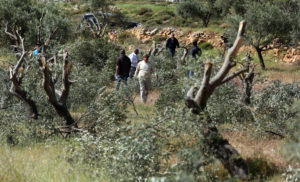
The alarming increase of brucellosis in the West Bank has prompted the Palestinian ministries of health and agriculture as well as the customs department to form a joint committee to fight the disease. (Photo: Ma’an)
Hebron, 2 Jumadil Akhir 1436/22 March 2015 (MINA) – The alarming increase of brucellosis in the West Bank has prompted the Palestinian ministries of health and agriculture as well as the customs department to form a joint committee to fight the disease.
Officials say that a high percentage of the cases of the bacterial infection, which is spread from animals to people largely through dairy products, comes through livestock smuggled from Israel.
According to the Ministry of Health’s director of preliminary care, Dr. Asaad Ramlawi, 130 cases of brucellosis have been diagnosed in the West Bank in the last few months, Ma’an News Agency quoted by Mi’raj Islamic News Agency (MINA) as reporting.
Brucellosis is a highly contagious infectious disease caused by the ingestion of unpasteurized milk or undercooked meat from infected animals or close contact with their secretions.
Also Read: Israeli Airstrikes Kill and Injure Dozens in Gaza City’s Zeitoun Neighborhood
It usually takes several weeks to treat using medication.
“With the beginning of spring, brucellosis starts to break out in southern Hebron and in Bethlehem due to lack of vaccination as well as the smuggling of animals from Israel,” Asaad Ramlawi told Ma’an, referring to the most well-known areas for breeding livestock in the West Bank.
In 2014, about 400 Palestinians were diagnosed with brucellosis, Ramlawi added. Hebron district had the lion’s share with 60 percent of the cases, Bethlehem came second with 15 percent, and all other West Bank districts together had 25 percent of the brucellosis cases in 2014.
The numbers show a steady increase over the years, with Ministry of Health figures showing that infections reached 243 in 2013, 184 in 2012 and 179 in 2011.
Also Read: Over 170 NGOs Demand End to Israeli Military-Controlled Aid Distribution in Ga
A Ma’an investigation in February suggested that at least part of the blame for the steady growth in infection rates was related to the Ministry of Agriculture’s failure to provide adequate numbers of vaccines to farmers.
But authorities argue that smuggling of livestock from Israel has made their task far more difficult than anticipated.
Ma’an reporter Muhammad Uweiwi accompanied custom agents and ministry of agriculture inspectors on a field patrol on the southeastern outskirts of the Hebron district in the southern West Bank. He was told that the area, which stretches about 350 square kilometers, is a fertile ground for livestock smugglers.
The field patrol included the areas where the Bedouin tribes of al-Kaabna, al-Jahalin, al-Sarayaa, al-Rashayda, Masafir Bani Naim, al-Rawain, Wadi al-Ghar, Khashm al-Daraj, Masafir Yatta, al-Mneizil, al-Mafqara, Maghayir al-Abeed, Khashm al-Karm, Um al-Daraj and Tawil al-Sheih live as well as other open areas nearby where tribes live.
Also Read: UNRWA Calls for End to GHF’s Operations, 500 Gazans Have been Killed
The area is very close to the border between the West Bank and Israel, and as a result it can be difficult to tell whether herds in the area belong to West Bank Bedouins or Bedouins who live in Israel.
Herds wander freely across the border despite the presence of Israeli military patrols, according to the director of customs in the Hebron district, Abd al-Karim al-Basayta.
Al-Basayta, who is from the area and used to pasture livestock in it, told Ma’an that the area was vast and difficult to control.
“These are Area C zones. Despite that, we have caught several trucks smuggling animals and rotten food products coming from Israeli settlements,” al-Basayta told Ma’an.
Also Read: Hamas Calls for Mass Mobilization to Defend Al-Aqsa Mosque
He highlighted that among the animals the customs agents caught were four cows infected with foot-and-mouth disease smuggled from an Israeli settlement whose intended destination was the town of al-Dhahiriyya.
“The motive behind this patrol was that lab tests proved that livestock smuggled from Israel showed several cases of brucellosis, the director of legal procedures at the Ministry of Agriculture Muhammad Huda al-Asmar told Ma’an.
A good policy to control diseases would be giving numbers to animals, but it would be difficult for the ministries of agriculture and health to do that in areas like Masafir Yatta and Masafir Bani Naim if the owner opposes numbering his animals, al-Asmar said.
Some breeders, he added, still oppose numbering their animals and that could delay the numbering project which the ministry of agriculture has started.
Also Read: Israel Destroys 74 Percent of Gaza’s Telecom Infrastructure
A local shepherd told Ma’an reporter that a small number of shepherds from inside Israel cross the borders to pasture their herds and some West Bank shepherds pasture their herds inside Israel. He added that he personally had seen smugglers bringing sheep from Israel. (T/P010/P3)
Mi’raj Islamic News Agency (MINA)
Also Read: Dozens of Israeli Settlers Storm Al-Aqsa Mosque Under Heavy Police Protection
































 Mina Indonesia
Mina Indonesia Mina Arabic
Mina Arabic